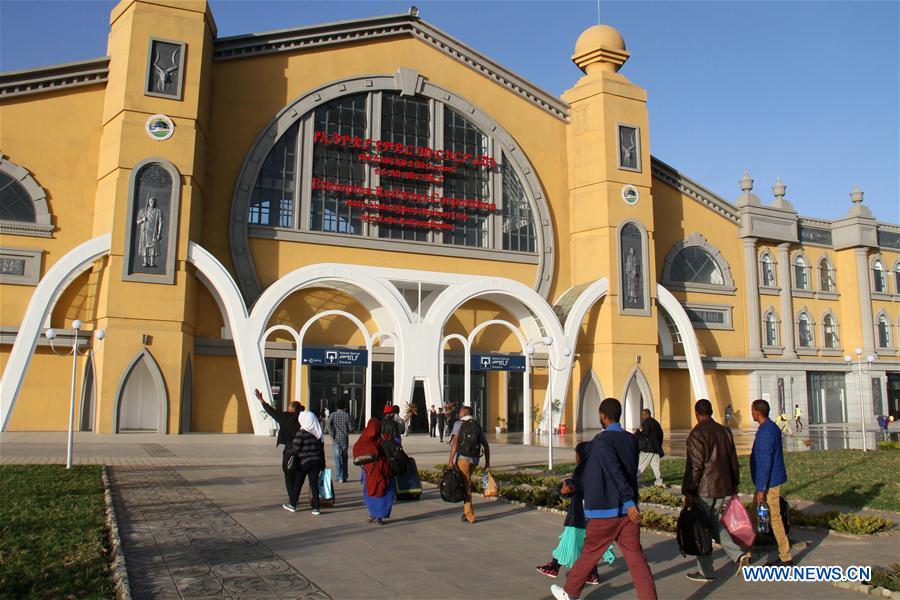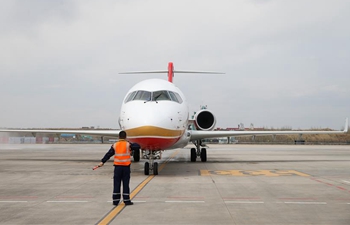
People walk into a station of the Ethiopia-Djibouti railway in Addis Ababa, capital of Ethiopia, on May 11, 2018. The 752-km railway links Ethiopia's capital Addis Ababa and the Red Sea nation of Djibouti. It is one of the many Chinese-built and -funded infrastructure projects that have sprung up on the African continent in recent years. (Xinhua/Lyu Tianran)
ADDIS ABABA, May 12 (Xinhua) -- Yusuf Abera still remembers his trips on Ethiopia's old railway during its last years in active service. They were hardly pleasant journeys, as trains were slow, noisy and often disrupted by mechanical glitches.
"It often broke down in the middle of a trip, and we had to wait for hours until it was repaired," said the 47 years old. But despite the railway's poor condition after 90 years in operation, its progressive closure in the new century still made frequent travelers like Abera upset, forcing him to travel via more expensive flights.
It was only in 2018 when Abera switched back to trains, this time thanks to the opening of the Addis Ababa-Djibouti railway (or Ethiopia-Djibouti Standard Gauge Rail), the first transnational electrified railway in Africa.
Waiting in the spacious, modernized hall of the Lebu Station in Addis Ababa, Abera compared the Chinese-built new railway with the almost defunct old rail line and other travel options like bus and airplane.
"It (the new railway) is safe and you don't have to worry about accidents or any other inconveniences," he said. "The comfort is almost similar to airplane service ... and it is financially more convenient than flight."
The 752-km railway links Ethiopia's capital Addis Ababa and the Red Sea nation of Djibouti. It is one of the many Chinese-built and -funded infrastructure projects that have sprung up on the African continent in recent years.
Ethiopia's travelers are quick to relish the new railway's comfort and reasonable fees. According to China Railway Group Limited (CREC), one of its builders and operators, the line transported 11,600 passengers in April, up from 4,400 in January when it commenced commercial service, suggesting its fast-growing popularity among the Ethiopians.
Akmel Kedir, a first-time passenger of the railway, was on a business trip to drive back imported vehicles from the port of Djibouti.
He said an affordable journey to Djibouti used to take three days on the bus. Now using the new railway, he could arrive in the coastal nation within the day of his departure.
"Spending three days on the road was very tiring and we had to spend more money on food and accommodation. In that sense, the train trip saves both time and money," he said.
Landlocked Ethiopia relies on the seaports of Djibouti for 95 percent of its import and export commodities. The railway, by offering an access to the port quicker than the road, is expected to reduce Ethiopia's import costs and expand its exports.
The railway is also at the center of Ethiopia's industrialization drive, as the government hopes to attract investment to the industrial parks along the line and boost their production by offering more efficient transportation.
Yet apart from the apparent benefits for businessmen and industries, Mertneshi Desta's case sheds light on the railway's another significance to the fast-growing African nation, where many people now choose to work far away from home.
Desta, who lives in Addis Ababa with her child, now takes the train to visit her husband who is among the many Ethiopians working in Djibouti.
"I like to visit him whenever possible. I used to take airplane flights to Djibouti, but since it was expensive I could not afford to fly often," she told Xinhua.
Desta is excited about the new train service, which charges 2,000 Ethiopian birr (about 72 U.S. dollars) for a round trip to Djibouti. In comparison, the cheapest round-trip flight to Djibouti costs about 3,400 birr (125 dollars).
"In the past, I flew to meet my husband once in three months ... Since the train service started, I've taken the train every month to visit him."















